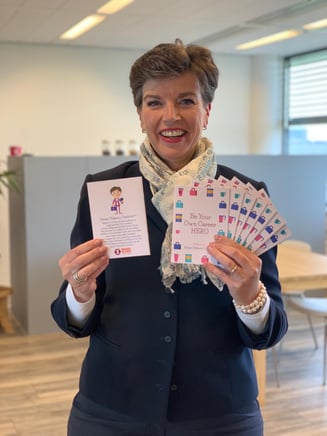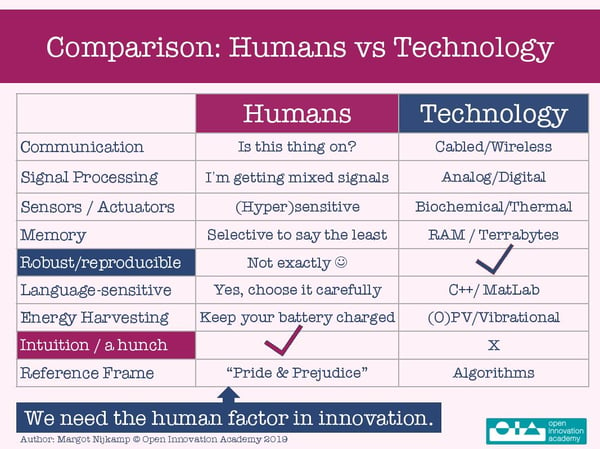.png)


‘Open innovation needs a feminine culture. We help organizations to build this capacity. This is very different from screening for gender. We talk about feminine culture aspects: teamwork and covering for each other, by exchanging and sharing, literally taking care of each other.'
The coming months we will introduce female and male role models who act upon increasing diversity in the tech industry. By telling their personal and career stories, we can inspire and learn from each other.
We are opening the series with Margot Nijkamp, Managing Director at the Open Innovation Academy and co-founder of ESTI (the EcoSystem Thinking Institute), a strong advocate for a human factor of technology, and a devoted ambassador of the Female Tech Heroes movement.
Could you tell a little bit about yourself and the work you do?
I should probably start with a warning that I might be the least technical person on the High Tech Campus. Although, throughout my career I’ve had the opportunity and absolutely wonderful task to hire a lot of technical people, among which a lot of women in tech. At the Open Innovation Academy we are looking at innovation from an organizational, cultural and philosophical point of view. We represent the human factor of technology.
What are the major challenges that females now face in the tech career?
The predominance of the masculine, not male, but masculine culture in the working environment is definitely a challenge, especially in larger and traditional organizations. Also the work-life balance often comes as a challenge for the feminine (women). They want to do everything perfect, but there is no perfect in this life, right? Another challenge that I have seen, especially within the scientific arena, is for women to reach boardroom level. And more so: if they do reach boardroom level, they very often leave quickly.

And why is that happening?
Because of the masculine way of interacting, everything is measurable, a competitive target and confronting each other in a political way. This is why many women do not feel comfortable on a boardroom level.
You help a lot of people on a daily basis. How do you hear women are dealing with these challenges?
We see lively discussions on how to create a more feminine culture towards an open innovation strategy, both in the public and the private sector. We see that women are growing in their career steps. Also, women graduate at a better and faster rate than men. But, having said that, the challenges are still present.
Are women stimulated enough to join tech?
One of the things that stimulates, is definitely less gender labelling. Women are truly invited to join tech and the numbers are growing. I also checked this during the last FTH conference in two statements: “I believe that having a gender policy in place is going to give females an entrance!” , “I want to be hired as the best human for the job.”The second statement got more votes from the audience. Of course: we do want to be hired because we are the best suitable candidate for the job at the time.
What should be done more to motivate women to join tech careers? Are these the concepts you also apply in Open Innovation Academy coaching tools?
It is a known fact: many organizations need open innovation in order to reach their goals. Access to knowledge is the new ownership of it. In order to introduce OI successfully, they need to create more feminine (tech) work environments. Be aware: this is not only through women, but also through men. Innovation flourishes by a rich diversity of the teams involved; diversity of language, knowledge background, nationality, religion and personal characteristics. The innovation culture we co-create with organizations like social housing organizations, education institutes and corporates like Unilever and Philips, contributes to their innovation results. We offer an innovation platform to get real working solutions, for real societal problems. This kind of heroism attracts people in terms of work environment. And so, we work with organizations to screen for femininity and masculinity. When we talk about feminine culture aspects we mean: teamwork and covering for each other, by exchanging and sharing, literally taking care of each other. And of course, if you have more women in the team, the chance of having feminine behavior is larger.
What is the biggest lesson you have learned as a female entrepreneur in the tech world?
Some people totally get my feminine approach, and some really don’t. What I’ve learned throughout the years is to focus on the ones that do and not waste energy on those who don’t. Collaborations are based on trust and if you don’t understand each other, it’s impossible to create trust.

Technology is a thousand times more robust than us humans, but the intuition and ‘hunch protocol’ is a challenge for technology, because it’s based on our subconscience. Since we do not fully understand how our subsconscience works, we cannot copy it. So, the conclusion is that we’ll always need the human factor as long as we haven’t cracked that code. Which is really good news. What we want in open innovation is for people to recognize something of themselves in the other, to create trust and dare to ask audacious questions. This is where serendipity takes place, the fortunate accident. This also goes back to the subsconscience; we do not know how to reproduce serendipity.One of the lessons I’ve learned is to steer on the compass of my intuition and to stay true to that path.
In the previous interview, you said that we have to move from perfection, to be our personal hero. Could you elaborate on that?
By creating expectations of ourselves that are ambitious but realistic. By not thinking for others, what their opinion is of what we do. We, the ‘feminine species’, assume that if it is not perfect others are going to think poorly of us. This is not the case. If we want to know what the others thinks, just ask for feedback. And then consider the feedback a gift. Someone takes time to help you improve. Also by learning to gracefully say ‘no’ and managing expectations, we become stronger professionals. The motto is: choose what you want out of life and stick to it. “Choose it or lose it!”
Photo credit: John Geven Studios
Learn more about the Female Tech Heroes movement and join us to create more diversity!